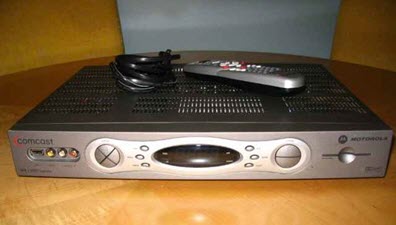Finally, after decades of having tight control over set-top cable boxes, cable TV companies in the U.S. are being challenged as the Federal Communication Commission is finally exercising its statutory responsibility to ensure competition. As you might expect, satellite and cable providers, along with some Hollywood studios, are not too happy about it.
Cable companies have long dictated what you can and cannot have in a set-top cable box. And, they have not allowed their subscribers any choice in the equipment they use to access cable programming. The obvious reason for this is because the cable companies earn more money by renting you their own cable boxes. That is bit like a municipal water supplier running water to you house, but, telling you that you can only drink the water from the glasses they rent you. FAIL!
Despite the objections and some fierce lobbying against the proposal to open up the set-top box arena, FCC commissioners voted 3-2 in favor of putting the proposal forward for public comment.
Tom Wheeler, Chairman of the FCC, said that the proposal would boost competition. Competition generally benefits the consumer. Consumers would have the choice to continue renting their device from the cable or satellite provider, or buying one of their own. It would establish an open platform so the makers of set-top boxes could innovate, and the devices would be unlocked so they can be used with more than a single cable or satellite company. Then, the box wouldn’t become obsolete if you switch from one provider to another.
There have been a variety of wild assertions about the affect of the open standard. But, Chairman Wheeler noted that the cable companies once supported a similar proposal.
Some critics say the proposal to open competition in set-top boxes could stifle innovation. But, history has shown us that it is the lack of competition that usually hobbles innovation.
The average cable/satellite consumer pays around $231 per years to rent the company owned set-top box. Competition could drive down the cost of set-top boxes and eventually save consumers hundreds.
The FCC chairman and at least some of the FCC commissioners want to see open standards to create fair competition. I say, it’s the American way and I look forward to the day I can choose my own set-top box based on its qualities and innovative merit, the same way I choose a cell phone or any other electronic device I use and rely on.
As a consumer, I say change in this arena can’t come soon enough. It’s time the cable/satellite consuming public got a fair shake.


In Canada, the cable companies are happy to rent you your converter box, but, at least in the case of my provider, Shaw Cable, you may buy a box outright, and several of the electronics stores carry them on their shelves. (Whether you can find a sale price is questionable)
We have three tvs in the home, each with a different model of converter. The oldest, a Motorola of similar vintage to the model pictured at the top of your article, is somewhat obsolete, in that its hard drive is rather small, as well as limited format translation. I think it may be MPEG4 that it is lacking, but, in any case, it cannot process some of the higher (resd: HD) channels which have been added relatively recently. Fortunately, the other two converters can handle the latest formats, although one has no HDD.
I have found, too, that selecting programming from the non-HDD converter’s VOD screens, which are much more comprehensive (and easier to navigate) than the other units, allows us to view selected programming on our larger screens. Whether this is a unique feature of Shaw tuners, I cannot say, but I find it handy for picking up programs I have missed.
Much of Canada’s population is unable to access any great variety of OTA programming, because of distance from the U.S. border, or because of few U.S. stations, such as along the borders of North Dakota and Montana. Because of this, we are very dependent on cable for any significant program selection.
Sports specialty stations, similar to ESPN (and who often rebroadcast ESPN programming) are cable-only networks, and, while providing much more “sports” than anyone really needs (darts and poker are regulars), without a cable connection, there is no sports at all, other than highlights during news shows.
Licencing of movies and other programs is unique to every country, and this results in Canada’s Netflix unable to show the U.S. version’s latest offerings. We are a season, or two, behind, unless one signs onto a VPN to hide the IP address. Similarly, we cannot use other computer-based sources for extended programming, such as The Daily Show’s interviews, or Bill Maher’s Overtime, or even replays of talk show segments.
Are you aware of upgrades to cable boxes to avoid technical obsolescence? I am thinking of HDD swaps or additions, to increase capacity of stored programs, and of converter changes to adapt to new encryption processes, as used by newer converters for additional, usually specialty, channels.
I have a converter similar to the unit in the photo, a Motorola model with a silver face.
Recently Comcast forced us to “upgrade” our cable box to their shiny new version. We hate it. The old setup gave us easy to read menus, quick response times, and one-click channel switching. Now we struggle, and it takes forever and three or five clicks to change the channel.
They ruined my internet connection in exactly the same way. I had to accept their new modem. I once had a great, quick internet connection. Now it drags and my my wi-fi doesn’t extend into the next room. It sucks. SUCKS!
And we pay plenty for this bad service.